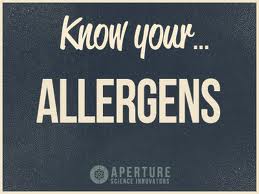Food Information on Allergens: no escape!
Posted: September 17, 2013 Filed under: Food, Information | Tags: allergen, allergens, food, information, labeling Leave a comment » Your company wants to provide bullet proof information on the food products it offers for sale in view of the upcoming changes in food legislation? This post may be helpful to you, as it highlights the issue of allergens and substances causing intolerances addressed by Regulation 1169/2011 on the provision of food information to consumers (“the Regulation”). You may recall that the rules laid down in the Regulation apply to food business operators at all stages in the food chain, where their activities concern the provision of food information to consumers. The new rules will in principle enter info force on 13 December 2014. However, in order to avoid time constraints by the end of 2014, a large number companies aim acting in compliance as soon as possible. What should be taken into account?
Your company wants to provide bullet proof information on the food products it offers for sale in view of the upcoming changes in food legislation? This post may be helpful to you, as it highlights the issue of allergens and substances causing intolerances addressed by Regulation 1169/2011 on the provision of food information to consumers (“the Regulation”). You may recall that the rules laid down in the Regulation apply to food business operators at all stages in the food chain, where their activities concern the provision of food information to consumers. The new rules will in principle enter info force on 13 December 2014. However, in order to avoid time constraints by the end of 2014, a large number companies aim acting in compliance as soon as possible. What should be taken into account?
The issue of allergergies/intolerances
As allergies and/or intolerances seem to occur more frequently nowadays, the Regulation aims to ensure that full information is provided to allow the consumer to make an informed choice. The EU here clearly follows the example of the US, where FDA requirements on labeling allergens information already is in place. The Regulation stipulates to this respect that any ingredient or processing aid causing allergies or intolerances used in the manufacture or preparation of the food and still present in the finished product shall be indicated in the list of ingredients.
How to list allergens/substances causing intolerances?
This should be done in descending order or weight, as recorded at the time of their use in the manufacture of the food, where the allergens should be emphasised by using a typeset that clearly distinguishes it from the rest of the ingredients, by means of font, style or background colour. If the product does not contain a list of ingredients, then it should mention as a minimum: ”contains….” followed by the allergens. For the time being, 14 types of allergens have been distinguished, but the Commission is at liberty to extend the current list on the basis of a delegated act.
Allergens obligations also for non-prepacked food
Whereas EU food legislation used to apply only to prepacked food, it is striking to note that the obligation to provide information on allergens/substances causing intolerances also applies to non-prepacked food. More precisely, such obligation exists for foods that are offered for sale to the final consumer or to mass caterers without prepackaging, or where foods are packed on the sales premises at the consumer’s request or prepacked for direct sale. So do not be surprised to find a warning at the cheese corner of your Albert Heyn grocery stating that the products sold contain lactose, beind one of the allergens defined under the Regulation.
Stricter national requirements/means of providing information
More particulars, such as the quantity of the allergens or its country of origin, may need to be mentioned too, but only if such has been declared mandatory under national law. The sensitive area of allergens allows Member States to formulate stricter requirements as well (albeit within the Regulation’s framework). However, they are also at liberty to adopt national measures concerning the means through which the information on allergens are to be made available.
How to handle non prepacked food requirements?
It can only be hoped for the Member States adopting national measures on the means of providing information in this area, adopt a practical approach. Although providing information “upon request” is not to be considered as a “means of providing information”, national measures may stipulate that detailed allergen/intolerance information may be given upon request of a consumer. However, such information should be provided in a conspicuous place and in such a way that it is easily visible and clearly legible. This is a practice that restaurants and cafes will need to get used to.
Conclusions
Allergies and substances causing intolerances are in the centre of interest. Many companies whom previously did not have to deal with information on allergies will find that the Regulation also applies to their business. In addition to getting acquinted with and stay posted on the EU allergens requirements, it is important to keep an eye on national legislation in this area. Member States are at liberty to formulate stricter national requirements here. Therefore, despite the aim of harmonization that the Regulation aims to achieve, obtaining local advice for the launch of a new product continues to be a sound plan. Also, stay tune to FoodHealthLegal, as we will provide you with information on requirements for the name of your product and other labeling requirements shortly.
